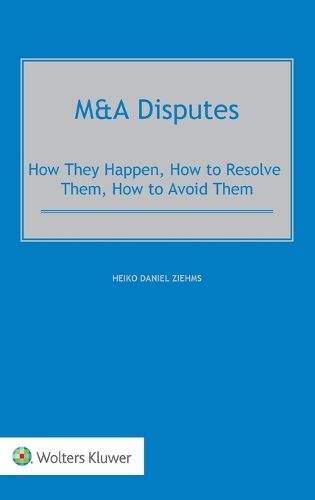Readings Newsletter
Become a Readings Member to make your shopping experience even easier.
Sign in or sign up for free!
You’re not far away from qualifying for FREE standard shipping within Australia
You’ve qualified for FREE standard shipping within Australia
The cart is loading…






M&A disputes, which range from breach of warranty and fraud claims to disagreements over price adjustments, earn-outs, material adverse change clauses and many others - are more common than many participants in M&A transactions may realise. They can take years to resolve and cost many millions of pounds, euros, or dollars. A dispute can adversely affect the post-transaction environment and hence the prospects of a successful acquisition or, at worst, frustrate a deal entirely. It is therefore vital to understand how such disputes happen, how they can be resolved, and how to avoid them, or at least minimise the potential for an M&A dispute. This indispensable practice guide provides not only a comprehensive discussion of the 'mechanics' of M&A transactions and purchase price adjustments but also a deeply informed analysis of what goes wrong in deals that leads to disputes and how to avoid (or resolve) such eventualities.
Originally intended as a second edition of the author's well-known M&A Disputes and Completion Mechanisms, published in 2018, this is in fact a new book, drawing on a new set of experiences and observations taken from a period where the scope for M&A disputes has intensified. Framed as an in-depth discussion of typical questions that confront those who assess financial and accounting issues in M&A disputes, including the question of damages, the analysis expertly investigates the pitfalls that can arise in such components of the process as the following:
the completion mechanism, including the rationale and basis of measurement of individual purchase price adjustments and the locked box; the role of accounting information in presenting, or misrepresenting, the underlying economic reality of a business and in informing a valuation; valuation principles, standards of value, and valuation methods used for M&A disputes; valuation matters specific to M&A disputes, including the question of value vs. price and the choice of counterfactuals;
$9.00 standard shipping within Australia
FREE standard shipping within Australia for orders over $100.00
Express & International shipping calculated at checkout
M&A disputes, which range from breach of warranty and fraud claims to disagreements over price adjustments, earn-outs, material adverse change clauses and many others - are more common than many participants in M&A transactions may realise. They can take years to resolve and cost many millions of pounds, euros, or dollars. A dispute can adversely affect the post-transaction environment and hence the prospects of a successful acquisition or, at worst, frustrate a deal entirely. It is therefore vital to understand how such disputes happen, how they can be resolved, and how to avoid them, or at least minimise the potential for an M&A dispute. This indispensable practice guide provides not only a comprehensive discussion of the 'mechanics' of M&A transactions and purchase price adjustments but also a deeply informed analysis of what goes wrong in deals that leads to disputes and how to avoid (or resolve) such eventualities.
Originally intended as a second edition of the author's well-known M&A Disputes and Completion Mechanisms, published in 2018, this is in fact a new book, drawing on a new set of experiences and observations taken from a period where the scope for M&A disputes has intensified. Framed as an in-depth discussion of typical questions that confront those who assess financial and accounting issues in M&A disputes, including the question of damages, the analysis expertly investigates the pitfalls that can arise in such components of the process as the following:
the completion mechanism, including the rationale and basis of measurement of individual purchase price adjustments and the locked box; the role of accounting information in presenting, or misrepresenting, the underlying economic reality of a business and in informing a valuation; valuation principles, standards of value, and valuation methods used for M&A disputes; valuation matters specific to M&A disputes, including the question of value vs. price and the choice of counterfactuals;